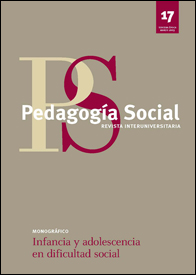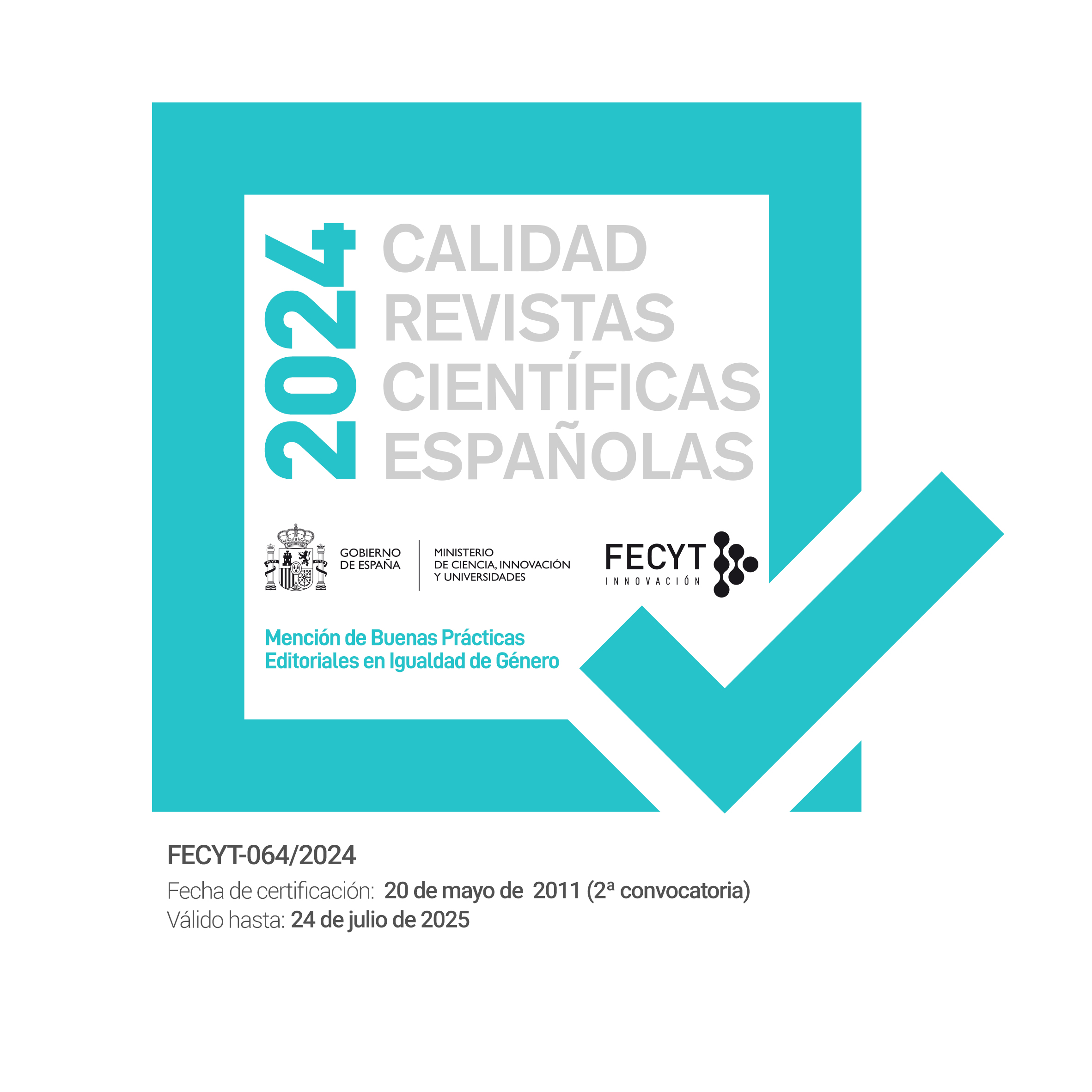Actuaciones socioeducativas con menores vulnerables, en riesgo, relacionados con las drogas. Reflexiones críticas.
DOI:
https://doi.org/10.7179/PSRI_2010.17.09Palabras clave:
Menores, vulnerabilidad, riesgo, normalidad social, socialización, grados de vulnerabilidad, factores de protección, consumo de drogas, pedagogía – educación social, intervenciones socioeducativas, Underage youngsters, vulnerability, riskResumen
Los menores vulnerables y su relación con las drogas forman una realidad social que cada día cobra mayor actualidad. Eso provoca la continua apertura de líneas de investigación. Los esfuerzos se encaminan a conocer más y mejor esa problemática y definir una manera más adecuada de abordarla, tarea que se atribuye a la Pedagogía Social y la Educación Social, disciplinas y profesiones para las que la niñez vulnerable y en riesgo constituye un ámbito tradicional de actuación socioeducativa.
En este trabajo, el objetivo es examinar los conceptos de ‘vulnerabilidad’, ‘riesgo’, ‘normalidad’ e ‘intervención educativa’ referidos a los menores en su relación con las drogas. Los citados términos son ambivalentes y relativos y, en consecuencia, tienen contenidos distintos que se construyen en función de diversas variables, en la mayor parte de las ocasiones contextuales a la coyuntura en la que se presentan. Por esa razón se ha hecho el abordaje de su definición puntualizando su relatividad, con el propósito de transmitir que para la realización de un diagnóstico es preciso tener en cuenta las peculiaridades que concurren en cada caso. Resultan necesarios ‘trajes a medida’ que se adapten a situaciones concretas y definidas. Sin ellos, las posibilidades de éxito en las intervenciones se reducen en gran medida.
Igualmente se estudian las características del consumo de drogas de los menores y se analizan las actuaciones orientadas al colectivo. Los resultados permiten sugerir algunas bases para una actuación bajo el prisma de la Educación Social, abandonado posiciones ancladas en idealismos que han impregnado las actuaciones en este ámbito. La tesis fundamental radica en la consideración del educando en cuanto sujeto activo y protagonista de su propio cambio, aún cuando esté bajo la condición de vulneración y riesgo.
------------------------------------------------------------------
The relationship between vulnerable, underage male and female youngsters and drugs is a social reality that is becoming more and more important at the present time. This, in turn, is opening new lines of ongoing research. Efforts are being aimed at gaining more and improved knowledge of this problematic situation, and at defining a proper way to address it. Competences in this field are attributed to Social Pedagogy and Social Education, disciplines and professions where vulnerable children at risk are a traditional area of socio-educational interventions.
The main objective of this paper is to theoretically examine the concepts of 'vulnerability', 'risk', 'normality' and 'educational interventions' with regard to youngsters in their relation with drugs. We hold that the above terms are relative and ambivalent and, consequently, have different contents subjectively built on the basis of several variables, mostly involving the particular circumstances of professionals themselves and the socio-political welfare framework. Therefore, in order to approach the definition of these terms, it seems necessary to take into account their own relative meaning with a view to making it evident that if an accurate diagnosis is to be made, then the peculiarities of the specific case must be taken into consideration. Made-to-measure solutions, tailored and adapted to specific, defined situations are needed. Without these, the chances of successful interventions are greatly reduced.
This reflection also takes into account the characteristics of drug use by the group as defined above, and discusses the actions that are normally addressed to it. This analysis allows some suggestions to be made about the real basis for effective social interventions within the framework of Social Pedagogy and Social Education, leaving aside positions anchored in idealisms which have commonly guided social interventions in this area. The central thesis is based on the consideration of the youngster as an active individual, playing a leading role in his/her own change, even in vulnerability and risk conditions.
Descargas
Descargas
Publicado
Cómo citar
Número
Sección
Licencia
Derechos de autor 2014 Pedagogía social. Revista interuniversitaria

Esta obra está bajo una licencia Creative Commons Reconocimiento-NoComercial 3.0 Unported.
Derechos de reproducción y archivo
La versión publicada de los artículos podrá ser autoarchivada por sus autores en repositorios institucionales y temáticos de acceso abierto. No obstante la reutilización total o parcial de los mismos en nuevos trabajos o publicaciones deberá ser autorizada por Pedagogía Social. Revista Interuniversitaria.
Los trabajos publicados deberán ser citados incluyendo el título de la Revista, Pedagogía Social. Revista Interuniversitaria, nº, páginas y año de publicación.
Responsabilidades éticas
Pedagogía Social. Revista Interuniversitaria no acepta material publicado anteriormente en otros documentos. Los/as autores/as son responsables de obtener los permisos oportunos para reproducir parcialmente material de otras publicaciones y citar correctamente su procedencia. Estos permisos deben solicitarse tanto al autor/a como a la editorial que ha publicado dicho material.
Es obligación de Pedagogía Social. Revista Interuniversitaria detectar y denunciar prácticas fraudulentas.
En la lista de autores/as firmantes deben figurar únicamente aquellas personas que han contribuido intelectualmente al desarrollo del trabajo.
La revista espera que los/as autores/as declaren cualquier asociación comercial que pueda suponer un conflicto de intereses en conexión con el artículo remitido.
Los autores deben mencionar en el manuscrito, preferentemente en el apartado del método, que los procedimientos utilizados en los muestreos y controles han sido realizados tras la obtención de consentimiento informado.
La revista no utilizará ninguno de los trabajos recibidos con otro fin que no sea el de los objetivos descritos en estas normas.
Aviso de derechos de autor/a
© Pedagogía Social. Revista Interuniversitaria. Los originales publicados en las ediciones impresa y electrónica de esta Revista son propiedad del Pedagogía Social. Revista Interuniversitaria, siendo necesario citar la procedencia en cualquier reproducción parcial o total.
Salvo indicación contraria, todos los contenidos de la edición electrónica se distribuyen bajo una licencia de uso y distribución “Creative Commons Reconocimiento-No Comercial 3.0 España” (CC-by-nc). Puede consultar desde aquí la versión informativa y el texto legal de la licencia. Esta circunstancia ha de hacerse constar expresamente de esta forma cuando sea necesario.






